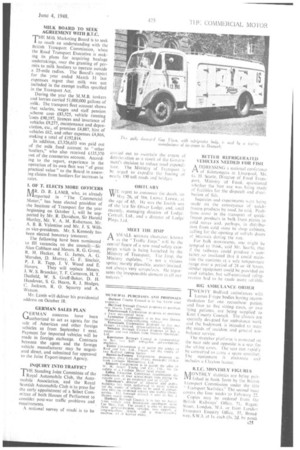BETTER REFRIGERATED VEHICLES NEEDED FOR FISH A DDRESMTNG a national conference
Page 27

If you've noticed an error in this article please click here to report it so we can fix it.
of fishmongers at Liverpool, Mr. G. II. Searle, Director of Food Transport, Ministry of Food, questioned whether the best use was beimg made of facilities for the dispatch and distribution of fish.
Inquiries and experiments were being twide on the conveyance of quickfrozen products by road, he said. Problems arose in the transport of quickfrozen products in bulk from plants to cold stores and, perhaps, in distribution from cold store to shop cabinets, calling for the opening of vehicle doors at intervals &rim., the run.
For bulk movements, one might be tempted to think, said Mr. Seurte, that if the railways could produce a container .so insulated that it could main lain the contents at a safe temperature range over a period of 24 or 48 1131.1fS, similar equipment could he provided on road vehicles, but self-contained refrigeration had to be made more reliable..
WC AMBULANCE ORDER TWENTY Bedford ambulances with .I. Lomas F-type bodies having accommodation for one recurnbent patient and four to five sitting cases, or two lying patients, are being supplied to Kent County Council. The chassis are specially designed for ambulance work and the bodywork is intended to inev.. the needs of accident and general ambulance service.
The stretcher platform is monmed on the near side and opposite is a seat for the sitting cases. The seat can rapidly he converted to carry a spare stretcher. The equipment is elaborate an.I includes u Clayton heater.
B.T.C. MONTHLY FIGCRES
MONTHLY statistics are being published in book form by the British fransport Commission under the title " Transport Statistics." The second issue covers the four weeks to February 22.
Copies may be ordered from the British Railways' Office, 71, Regent Street, London, W. I. or from London Transport Enquiry Office, 55, Broadway, S.W.1, at Is. each (Is. 2d, by post).
















































































